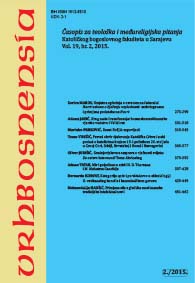Mir i pojedinac u misli H. D. Thoreaua i M. Mahatme Gandhija
Peace and the Indivudual in the Thought of H. D. Thoreau and M. Mahatma Gandhi
Author(s): Adnan TatarSubject(s): Ethics / Practical Philosophy, Political Philosophy, Social Philosophy, History and theory of political science
Published by: Katolički bogoslovni fakultet
Keywords: H. D. Thoreau; Mahatma Gandhi; individual; duty; freedom; peace;
Summary/Abstract: Research into the duties of the individual in the work of the American thinker, activist and naturalist Henry David Thoreau, and the leader of non-violent resistance to British colonial administration in India Mahatma Gandhi, offers theoretical insights into one of the most important phenomena of social science and the study of human kind. The opinions and active role of Thoreau and Gandhi represent a pragmatic attitude to the personification of human dignity, as a value that surpasses all other ideas, ideals and principles. This paper examines the actions and thinking of the individual as citizen while striving to highlight all the important aspects of 'civil disobedience', not as a license for anarchy but as the idea of civil duty. In this way, the two subjects of the article place the individual before the ideological concept of nation, race, class and party as the supreme value in itself. It is on this fundamental value that Thoreau and Gandhi build their own concept of peace.
Journal: Vrhbosnensia
- Issue Year: 2015
- Issue No: 2
- Page Range: 397-428
- Page Count: 32
- Language: Croatian

